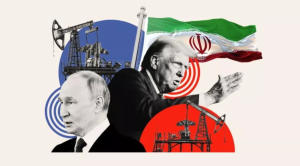Even before Donald Trump named Elise Stefanik the new U.S. ambassador to the United Nations, the New York representative had touted how the president-elect would return to a “maximum pressure” campaign on Iran.
The Wall Street Journal said Trump would “drastically increase” sanctions to “choke off” Iran’s oil income, which the U.S. Energy Information Administration reported last month reached $144 billion between 2021 and 2023 and $34 billion in 2024.
But could Trump’s alignment with Israel and intention to throttle the Islamic Republic’s exports of 1.7 million barrels of oil a day impact Russia’s sales of its key revenue generator? Factors that will come into play include how Middle East tensions play out.

“When Trump enforces the sanctions, Iran will retaliate to demonstrate that if it is not allowed to generate oil revenue and conduct commerce, then other countries in the region may not be able to either,” Matt Gertken, chief strategist, geopolitical and U.S. political strategy at BCA Research, told Newsweek.
“I think we’ll see some surprise events, maybe some sabotage or some attacks that threaten—but not devastate—global oil supply from the region.”
Trump’s expected new secretary of state, Florida Senator Marco Rubio, is also hawkish, saying Israel has the “right to respond disproportionately to stop” the threat posed by Tehran and its proxies, which include Hamas in Gaza and Hezbollah in Lebanon.
Strikes on Iran’s missile defense, Hezbollah on the back foot and internal instability in the Islamic Republic due to inflation and shortages have created an environment that Israel may believe “is too good to pass up,” Gertken said.
There could be an Israel attack on Iran’s domestic fuel supply, and Israel “may even go so far as to stage strikes or prepare to stage strikes or sabotage the nuclear program,” he said.
In 2018, Trump withdrew the U.S. from the Joint Comprehensive Plan of Action (JCPOA), also known as the Iran nuclear deal, which the Biden administration sought to revive.
Trump has a close relationship with Israeli Prime Minister Benjamin Netanyahu, one of the first world leaders to congratulate him after his victory last week. Gertken said if Israel and the U.S. were to work together on air strikes against Tehran’s nuclear program, “then Iran will close the Strait of Hormuz, and we’ll lose maybe 18 million barrels of oil per day.”



